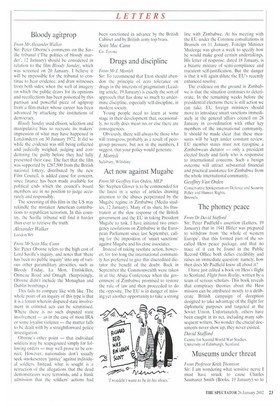Bloody agitprop
From Mr Alexander Walker Sir: Peter Oborne's comments on the Saville tribunal ('The politics of bloody murder', 12 January) should be considered in relation to the film Bloody Sunday, which was screened on 20 January. I believe it will be impossible for the tribunal to continue to hear evidence, and draw witnesses from both sides, when the well of imagery on which the public draws for its opinions and recollections has been poisoned by this partisan and powerful piece of agitprop from a film-maker whose career has been advanced by attacking the institutions of democracy.
Bloody Sunday used elision, selection and manipulative bias to recreate its makers' impression of what may have happened in Londonderry on 30 January 1972. It did so while the evidence was still being collected and judicially weighed, judging and condemning the guilty before they had fully presented their case. The fact that the film was supported by £287,500 from the British national lottery, distributed by the new Film Council, is added cause for concern, since finance has been made available for political ends which the council's board members are in no position to judge accurately and responsibly.
The screening of this film in the US may rekindle the mistaken American contributions to republican terrorism. In this country, the Saville tribunal will find it harder than ever to retrieve the truth.
Alexander Walker
London W9
From Mr Sean Mac Cann Sir: Peter Oborne refers to the high cost of Lord Saville's inquiry, and notes that 'there has been no public inquiry' into any of various other paramilitary atrocities, such as Bloody Friday, La Mon, Enniskillen, Ormeau Road and Omagh. (Surprisingly, Oborne didn't include the Monaghan and Dublin bombings.) This fails to compare like with like. The whole point of an inquiry of this type is that it is a forum wherein disputed state involvement in criminal acts can be scrutinised. Where there is no such disputed state involvement — as in the case of most IRA or some loyalist violence — the matter falls to he dealt with by a straightforward police investigation.
Oborne's other point — that individual soldiers may be scapegoated simply for following orders — may well prove to be correct. However, nationalists don't usually seek smokescreen 'justice' against individual soldiers. Instead, what is sought is a retraction of the allegations that the dead demonstrators were terrorists, and a frank admission that the soldiers' actions had been sanctioned in advance by the British Cabinet and by British army top brass.
SeOn Mac Cann
Co. Tyrone


















































































 Previous page
Previous page